Top 10 Squares in Rome
Rome's majestic squares hide sculptures, fountains and dreamy corners. Here is a list of my favourites for you to include in your itinerary.

St. Peter's Square, Vatican City | ©Caleb Miller
In Rome's monuments and buildings you will find remnants of ancient history, imperial grandeur and opulence. But it is in its squares that you can feel the true essence of the Eternal City, as you watch life go by and Roman customs come alive. These are my favourites:
1. Piazza Navona
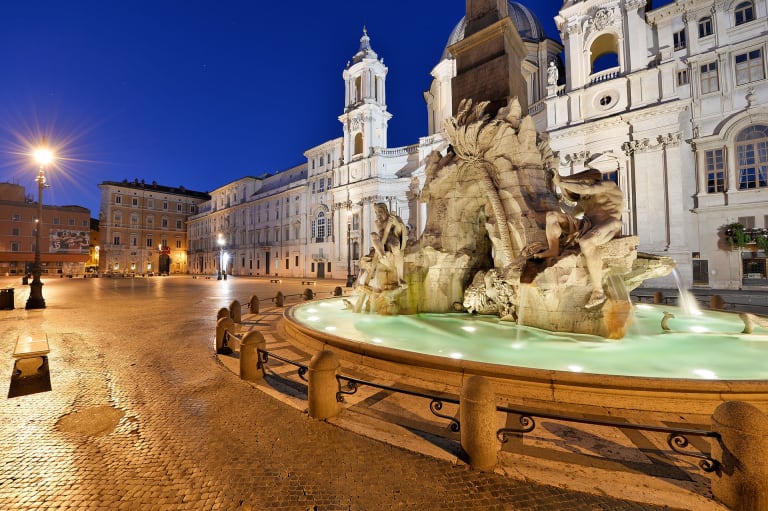
We can start this list in no other way than by introducing Rome's great Baroque square, Piazza Navona, one of the city's most prominent squares since Antiquity. Built on the ruins of Diocletian's Stadium, most guidebooks will tell you that its trio of baroque fountains, Bernini's Fontana dei Fiumi, the Fontana di Nettuno and the Fontana del Moro, are the main attraction of Piazza Navona.
And although they are not wrong, I particularly like this square because of a tradition told in the history books. Between the 17th and 19th centuries, the square was flooded with water and parades were held with boats and nautical costumes, which only makes sense once you realise that the floor of the square is concave in shape.
Piazza Navona is one of the most iconic places to visit on Rome city tours, which I recommend you do to explore every nook and cranny and not miss anything.
How to get to Piazza Navona
Walking is the best way to get there. I recommend the walk that starts at the Spanish Steps and ends at Piazza Navona, which is well signposted, and on the way you can visit the Trevi Fountain and the Pantheon.
2. Piazza del Popolo
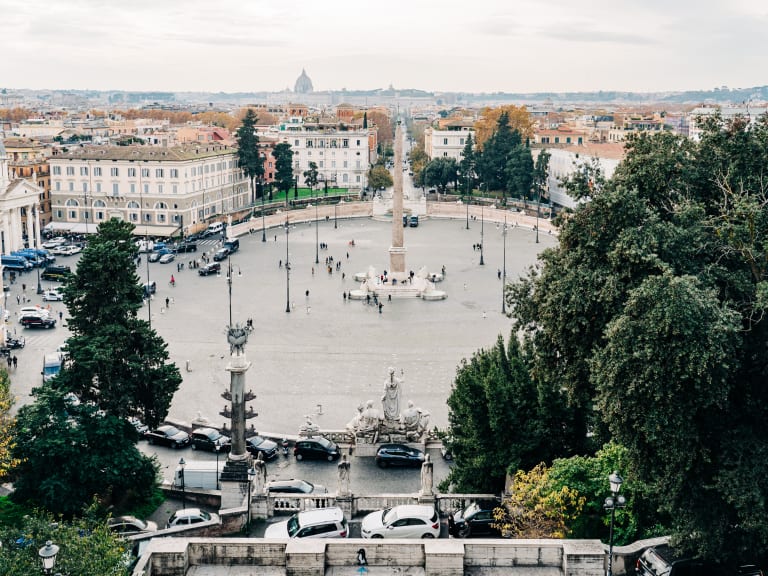
This emblematic square in Rome, crowned by the Flaminian Obelisk which originally stood in the Circus Maximus, is an important agora of Roman public life even today.
The square is home to three churches, Santa Maria dei Miracoli and Santa Maria in Montesanto, two apparently identical temples but each with its own secrets and peculiarities, and the Church of Santa Maria del Popolo, one of the most visited churches in Rome for housing no less than two paintings by the baroque artist Caravaggio.
How to get to Piazza del Popolo
The closest metro station to Piazza Del Popolo is Flaminio, from the exit of which you can reach the square in a minute or two on foot.
3. Piazza di Spagna
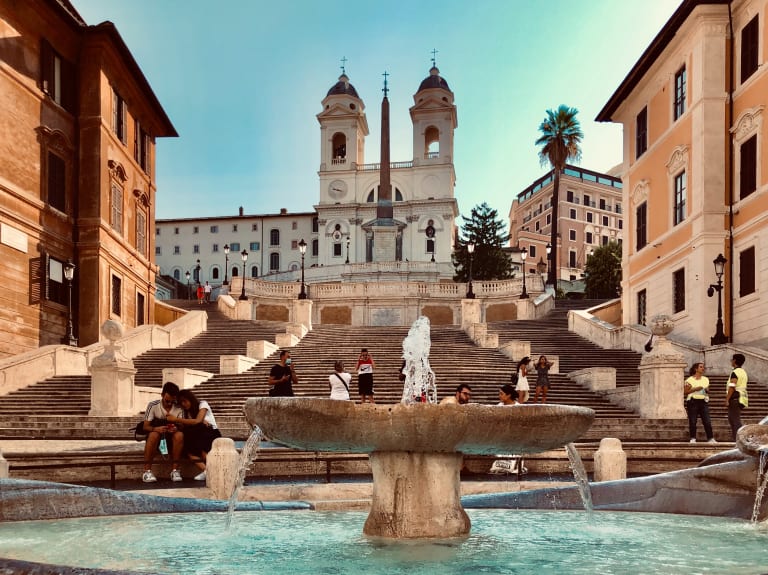
This square is the site of the famous staircase, built in 1723 to connect the church of Trinità dei Monti with Via dei Condotti. Many 19th century Romantics admired the beauty of this square and some of them took up residence here, such as John Keats and Goethe. In fact, Keats' house is to the left of the steps and is today a museum dedicated to the literature of Keats and Percy Shelley.
In spring and summer, the steps are filled with flowers and the Fontana della Barcaccia, the fountain at the foot of the steps, refreshes the square which, day or night, is always crowded.
How to get to Piazza di Spagna
Piazza di Spagna is easily accessible via the metro stop of the same name. From the square, you can access the famous Via Condotti, with its boutiques and luxury shops, which in turn connects to Via del Corso.
4. Piazza Santa Maria in Trastevere
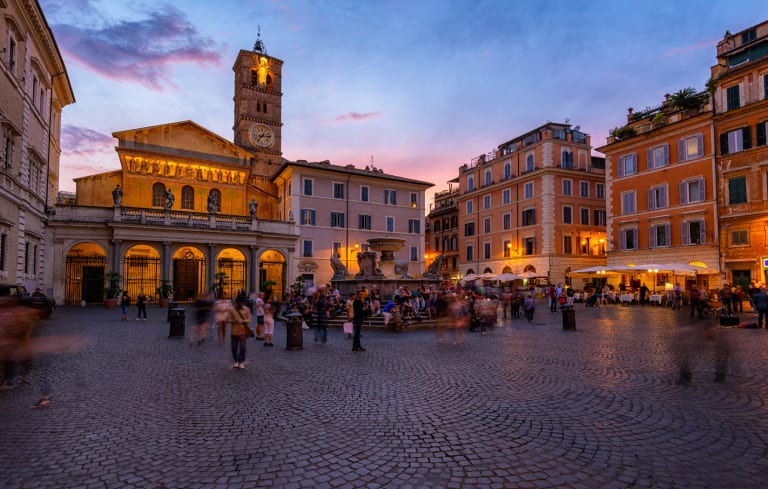
This square is located in the heart of Trastevere, in the middle of a maze of narrow alleys and cobbled streets. The most interesting feature of the square is the church of Santa Maria with its 12th century mosaics on the façade and its impressive frescoed interior apse.
Both the atmosphere and the lighting make the square especially beautiful at night, and the fountain in the centre is a favourite meeting place for locals. On Sunday mornings, the square smells of the abundant incense placed in the church of Santa Maria, and the atmosphere is very calm and welcoming.
Once here, I recommend you discover the other corners of Trastevere and fall in love with all that this neighbourhood of Rome has to offer.
How to get to Rome
You can reach Piazza Santa Maria in Trastevere by tram, getting off at the Trastevere - Mastai stop (8), and by bus with lines 115, 125, 780, N8.
5. Piazza della Bocca della Verità
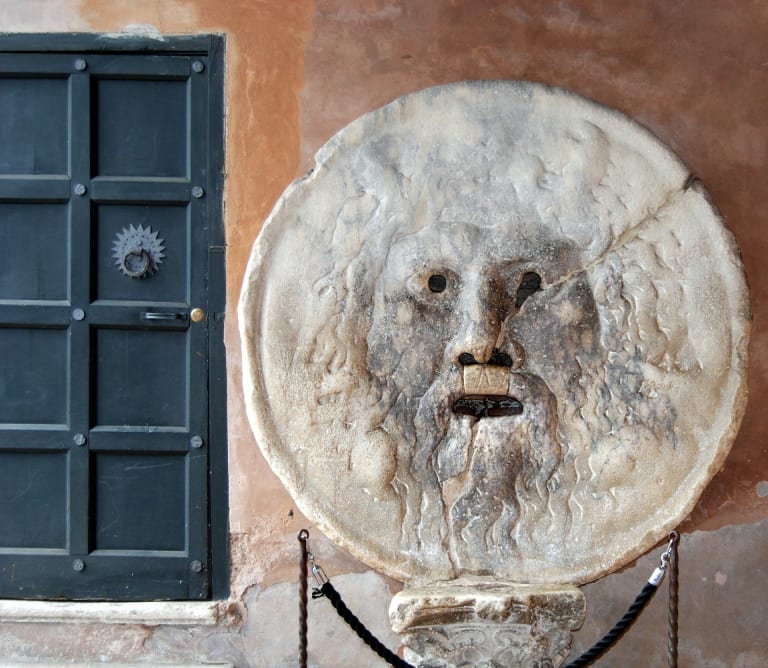
Piazza della Bocca della Verità is right in front of the Tiber Island, where the Church of Santa Maria di Cosmedin is located. Its inner portico houses the Bocca della Verità, the famous marble mask where so many visitors come to see if the legend that the mouth closes over the hand of a liar is true.
In the same square, opposite the church, you can also see a temple dedicated to Hercules and the Fountain of the Tritons.
How to find us
If you are in Trastevere or plan to spend the afternoon around the Tiber Island or the Circus Maximus, it will be very easy to walk to this square from there. If you want to go directly, there are a number of buses that will take you there: 44, 44F, 83, 160, 160F, 170, 175, 716, 781, C3, N9, and N19.
6. Piazza Venezia
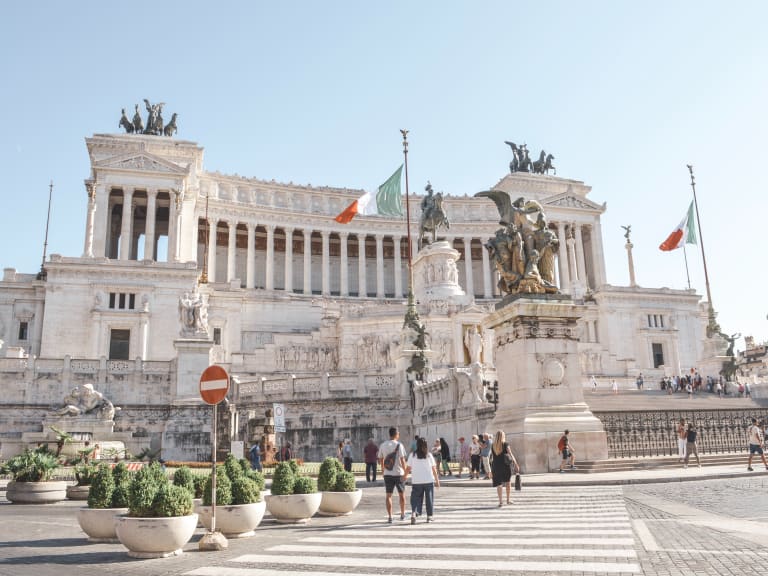
Piazza Venezia is to Rome what the Trocadéro is to Paris. It is considered the centre of the city and is the connecting point of two main streets: Via dei Fori Imperiali and Via del Corso. Presiding over the square is the Vittoriano building, the national monument dedicated to Victor Emmanuel II.
The name of the square comes from what is known as Palazzo Venezia or Palazzo Barbo, a Renaissance-era building that was built as the seat of the embassy of the Republic of Venice. In 1929 and during the years of fascism, this building became the centre of Mussolini's government, and from the balcony of the building the leader himself proclaimed his speeches to the people of Rome.
How to get to Piazza Venezia
By metro, taking line B and getting off at the Colosseo stop, or by bus on lines 170, 70 and 716.
7. Piazza di Trevi
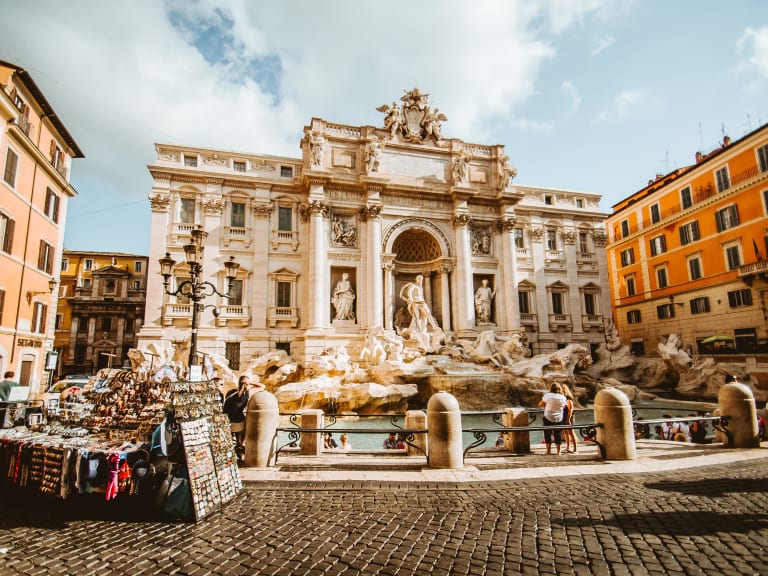
There is hardly any need to introduce this square, perhaps the most famous in Rome, where the wonderful Trevi Fountain is located. Always remembered for being the site of one of the most iconic film scenes in 'La dolce vita', it is one of Rome's most popular attractions and a must-see on any tourist itinerary in the city.
One thing that is easy to miss on a first visit to Rome is that much of the Trevi Fountain's majesty is in its backdrop, which is actually the façade of the Palazzo Poli located just behind it. The fountain's great theme is the taming of the waters, with sculptures of tritons and seahorses under the gaze of Neptune.
To avoid the crowds, it is best to visit the Piazza di Trevi at dawn or early morning, two times when the fountain is also particularly beautiful.
How to get to Piazza di Trevi
You can reach the Trevi Fountain by metro, getting off at the Barberini stop (line A) or by bus. Some of the buses that drop you off nearby are 52, 53, 62, 63, 71, 83, 85, or 116. You can also walk there easily from Piazza Navona or from the Pantheon.
8. Piazza della Rotonda
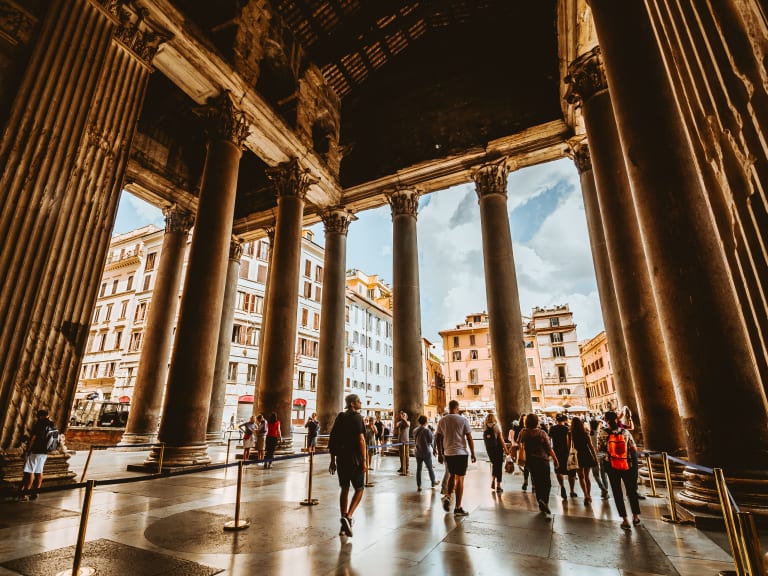
The Pantheon, one of the city's most important ancient monuments, dominates this emblematic square. During the day, it is an attraction for large crowds of tourists, but in the evening it is still a place frequented by many locals for a coffee on one of the terraces surrounding Piazza della Rotonda.
The name of the square comes from the current use of the Pantheon as a temple, whose name is Santa Maria Rotonda or Santa Maria dei Martiri. Entrance to the Pantheon is free, and if the majesty of the exterior has not left you open-mouthed, I recommend you explore the interior and marvel at what is, without doubt, the best preserved building of Ancient Rome.
Inside the Pantheon you can see the tombs of several Italian kings, frescoes, mosaics and sculptures, in the unique atmosphere created by the large oculus in the ceiling, which allows natural light to enter.
How to get to the Pantheon
Either on foot from Piazza Navona, or by bus. Buses 40, 60 and 64 will take you quite close, and most of Rome's Hop-on Hop-off buses stop in adjacent streets and squares.
9. Piazza Campo de' Fiori
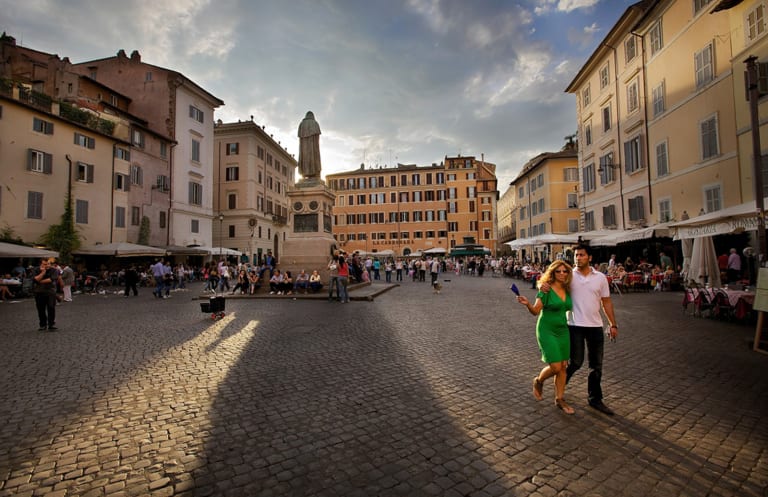
The Campo de' Fiori square is included in this list not so much for its beauty, but for its rich history and importance in Rome's public life. During the day, an open-air flower market is held here, and you can also find stalls selling all kinds of products and handicrafts.
For centuries, this square was the place where public executions were carried out, and in memory of this a statue was erected in honour of Giordano Bruno, who was burned alive in the square for his theories on astronomy.
The medieval atmosphere of this square, as well as being one of the few in Rome without a church, is what distinguishes it from all the others. Around it you will find taverns and inns, and in the evening it becomes a popular place to dine or have a drink.
How to get to Campo de' Fiori
Campo dei Fiori is located right in the historic centre of Rome, so you don't have a metro stop in the square itself. It can be easily reached by bus or from the centre on foot, or by taking a stroll from nearby metro stops such as: Piazza di Spagna (line A), Colosseo (line B) and Termini (lines A and B).
10. Piazza San Pietro

Without a doubt, I would go so far as to say that this is the most beautiful square in the world. The ultimate example of Italian baroque and an architectural masterpiece, presided over by St. Peter's Basilica.
The best way to reach St. Peter's Square is to cross Via della Conciliazione, a road where the spectacle of the basilica is presented before your eyes and invites you to enter the embrace of the square's ellipse of colonnades.
Bernini, who was in charge of designing this very important square, gave it a strong symbolic meaning to guide the faithful inside the basilica, and he thought of a theatrical spectacle that would come as a surprise to the eyes.
This is why, if you want to enter St. Peter's Square as it was originally conceived, it is best to enter through one of the two side entrances to the square, either via Borgo Santo Spirito or via Via dei Corridori, so that you will find the Basilica in all its grandeur in front of you.
The size of the square is designed to accommodate a mass of people, which you can see every Wednesday morning when the Pope himself leads the prayer. Until 1pm, St. Peter's Basilica is closed for what is known as the papal audience.
While visiting the square, I recommend rounding off your experience with a tour of the Vatican Museums, where you will discover the breathtaking beauty of the Sistine Chapel.
How to get to Piazza San Pietro
If you want to get to Piazza San Pietro easily, the best way is to take metro line A towards Battistini, get off at Ottaviano-San Pietro station and walk until you reach the square. Depending on how you want to enter, this option may not be the best way to enter via Via della Conciliazione, but you can walk along the streets surrounding the square to take the route that suits you best.
